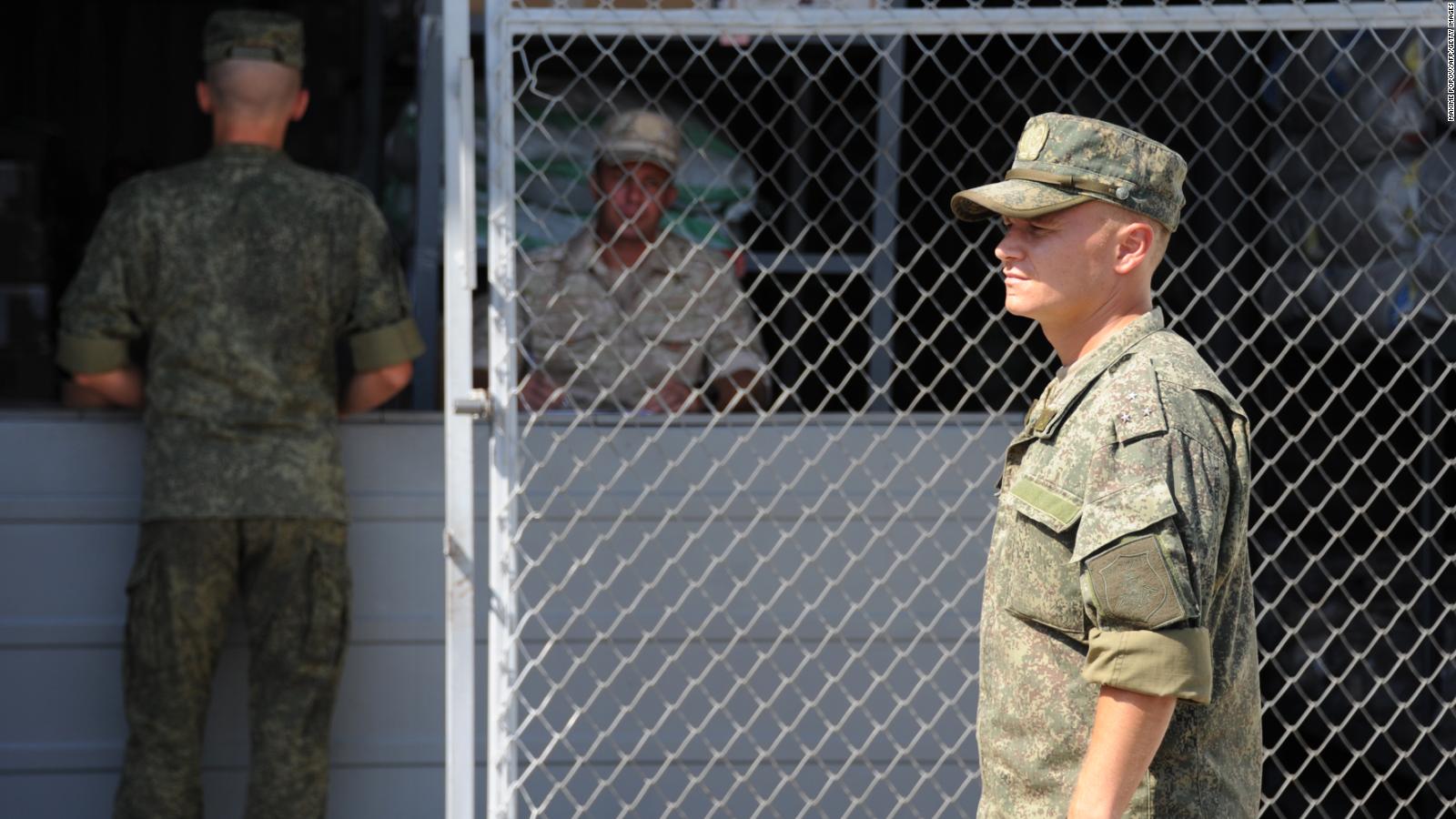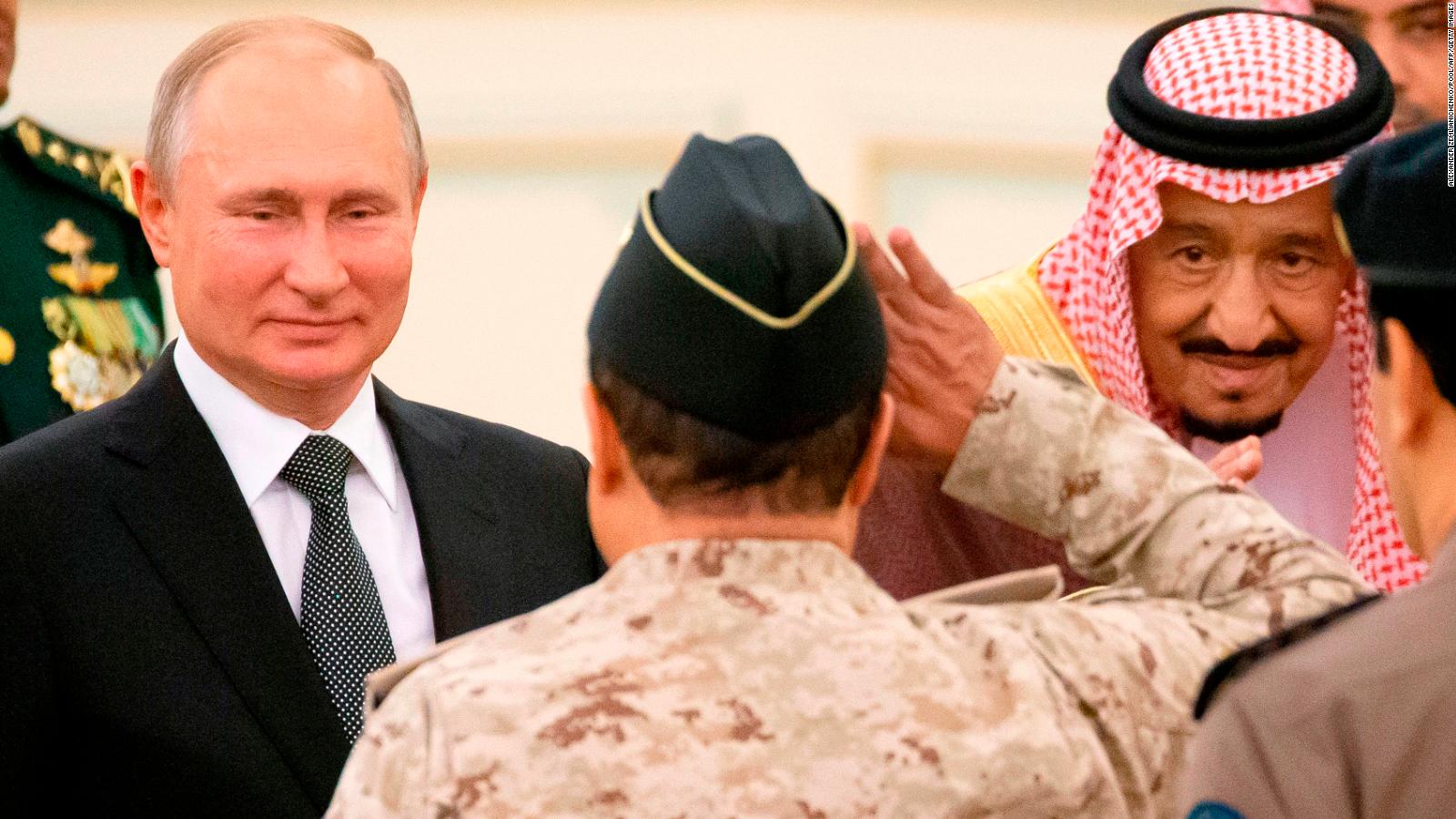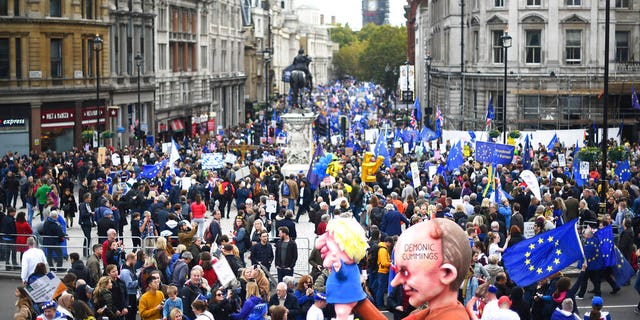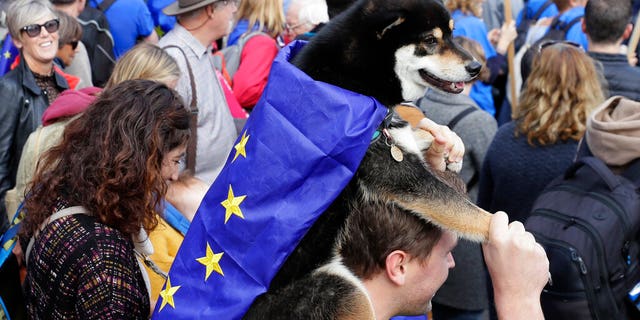Parliament members voted Oct. 19 to withhold support for Prime Minister Boris Johnson’s Brexit deal until all the supporting legislation has passed.
The British Parliament held an extraordinary Saturday session to debate Prime Minister Boris Johnson’s Brexit deal. Here’s what we know so far:
● Lawmakers voted to withhold support for Johnson’s deal until all supporting legislation has passed.
● A British law requires the prime minister to request a Brexit delay if a deal is not approved by Oct. 19, but Johnson said, “I will not negotiate a delay with the E.U. And neither does the law compel me to do so.”
● Anti-Brexit protesters are marching through the streets of London. Some Brexit-supporting lawmakers reported requiring police escort.
///////
LONDON — British lawmakers voted Saturday to withhold support for Prime Minister Boris Johnson’s new Brexit deal, scuppering his hopes to finalize Brexit on an extraordinary “Super Saturday” but not dealing a fatal blow to the withdrawal agreement he negotiated in Brussels.
The successful amendment, from the Conservative Party rebel Oliver Letwin, was designed to box Johnson in — so he cannot force Britain to leave the European Union until lawmakers have scrutinized and passed all necessary legislation for an orderly exit.
Johnson’s allies branded it a sneaky attempt by an obstreperous Parliament to defy the will of the people and gum up the Brexit trajectory.
The vote was close: 322 in favor and 306 against.
It was an anti-climactic conclusion to a day that saw lawmakers gather on a Saturday for the first time in 37 years, since when Britain fought in the Falklands.
Johnson responded to the parliamentary beatdown with emphatic finger-jabbing. The prime minister insisted, “I’m not daunted or dismayed by this particular result.” He vowed he would “not negotiate” a delay with the E.U. — which doesn’t mean he won’t ask for one.
Johnson warned the House of Commons that “further delay would be bad for this country, bad for our European Union and bad for democracy.”
Jessica Taylor/UK Parliament
Reuters
“I’m not daunted or dismayed by this particular result,” Prime Minister Boris Johnson said.
The prime minister said he would seek approval of his Brexit deal in the coming week.
But according to legislation passed last month, if a deal has not been approved by 11 p.m. local time on Oct. 19, Johnson is required to formally seek a three-month extension beyond the Oct. 31 Brexit deadline, potentially pushing any exit into early 2020.
How — or when or if — Johnson requests a delay is now an unanswered question.
The leader of the opposition Labour Party, Jeremy Corbyn, said he hoped Johnson did not believe “he’s above the law” and warned that the prime minister would find himself in court if he didn’t send a letter requesting an extension.
European leaders are sick and tired of Brexit talks, but almost certain to agree to an extension. Most E.U. policymakers already worried it would be impossible to get all the pieces of the split in place by the end of October. So a request to delay would be pushing on an unlocked door.
“If Johnson asks the European Union to grant an extension, it should be approved, since a modified agreement on the terms of withdrawal has been reached,” Latvian Foreign Minister Edgars Rinkevics told Latvia’s LETA news agency after Saturday’s vote. “It is in everyone’s interest that the Brexit is arranged in an orderly manner.”
European leaders would probably move quickly to hit the Brexit pause button, although they have not yet decided whether they would need to meet in person to do so.
In his remarks on Saturday, Johnson emphasized that the Brexit debate — which he launched as a leader of the 2016 referendum campaign — has taken a toll.
“Friendships have been strained, families divided, and the attention of this house consumed by a single issue that has at times felt incapable of resolution,” he said.
The prime minister called his deal “a new and better way forward” for Britain and Europe.
The British leader will need to win 320 votes in Parliament to pass his Brexit deal. Number crunchers on Saturday morning said it was too tight to call, but could see pathways for him to win the support he needs.
[How Boris Johnson could pass his Brexit deal — and who could stand in the way]
Simon Dawson
Reuters
E.U. supporters march as Parliament debates Brexit.
Underscoring how the country remains deeply divided on Brexit, thousands of protesters spilled into London from across the county to demand a second referendum.
Some Brexit-supporting lawmakers reported that they required police escort to get home.
“Why do the so called ‘People’s Vote’ protesters think it’s ok to abuse, intimidate and scream in the face of someone they don’t agree with,” tweeted cabinet member Andrea Leadsom. “So frightening, and so grateful to the police.”
The demonstrations, though, were largely peaceful.
Lawyer Saira Ramadan, 36, was there with her 7-year-old son. She said it was “our last real opportunity to make our voices heard as publicly as possible, and in large numbers.”
Asked about the claim that people are exhausted by Brexit, she said, “It would be disingenuous of me to suggest that there isn’t a feeling of Brexit fatigue... but that’s not to say that should be a reason for those of us who feel strongly enough to take it lying down and give up because we want it done.”
For more than a year, polls have shown that if there were a countrywide “do over vote,” Britons would, by a narrow margin, opt to stay in the E.U.
Polling firm YouGov reported that 30 percent of Britons favor Johnson’s deal, 17 percent want to get out without a deal to manage the transition and 38 percent want to remain in the E.U., with the final 15 percent unsure.
Johnson swatted away calls for a second referendum and continued to press lawmakers to get Britain out by the end of October, as he has promised many times, “do or die.”
[U.K. and E.U. approve new Brexit deal, setting up potentially close vote in U.K. Parliament]
On the floor of the chamber, Johnson said Britain has long had a divided heart over Europe. It is skeptical, dubious and halfhearted about Europe’s grand projects, for further integration, for more federalism on the continent, for a Europe-wide defense pact, for a unified economic policy.
“We are skeptical about European integration,” he said, “But passionate about Europe.”
Corbyn said lawmakers should reject Johnson’s deal.
“I also totally understand the frustration and the fatigue across the country and in this House,” Corbyn said. “But we simply can’t vote for a deal that is even worse than the one the House voted to reject three times.”
One challenge for the prime minister: there has been scant time to scrutinize the Brexit deal Johnson struck with the E.U., which could be to his liking.
Even some friendly lawmakers who support Brexit have complained they want to read the government’s own economic analysis of the cost of Johnson’s deal before they vote on it.
“His strategy has been the same as Theresa May’s strategy,” said Simon Usherwood, a professor of politics at the University of Surrey. “Present a deal, and then bounce, bounce, bounce it straight through. Before you know it, you’ve agreed something, and don’t worry about the details.”
Uk Parliament
Via Reuters
Speaker John Bercow speaks during the Brexit debate on Saturday.
May presented her withdrawal agreement to Parliament three times — and three times she was rejected.
On Saturday, now a backbencher, May rose to speak in the chamber and confessed a sense of deja vu. But she offered full-throated support for Johnson. If Parliament doesn’t back the deal, May said, “it is guilty of the most egregious con trick on the British people.”
Her voice rising with passion, May said, “If you don’t want no deal you have to vote for a deal. Businesses are crying out for certainty. People want certainty in their lives.”
Johnson — who has campaigned under the banner of “Get Brexit Done” — could have another factor working in his favor: “Brexhaustion.” In a sign of the times, Sky News on Friday launched its own completely Brexit-free news channel, hoping there is a market for people who want a break from Brexit but not the news.
Johnson’s new Brexit deal offers a more distant relationship with the E.U. than the agreement struck by his predecessor. However, his plan would see Northern Ireland stay largely aligned to the E.U., even though it would leave the block with the rest of the U.K.
[What is happening with Brexit now? Boris Johnson’s plans for the Irish border and the E.U. explained.]
The Northern Ireland’s Democratic Unionist Party said the deal was not in the province’s “long-term interests.” Its 10 lawmakers are expected to vote against the deal on Saturday.
“It was once said that no British prime minister could ever agree to such terms,” DUP lawmaker Nigel Dodds said in Parliament. “Will he now abide by that and reconsider the fact that we must leave as one nation together?”
John Major and Tony Blair said in videos published for the People’s Vote campaign that Johnson’s deal risked derailing peace in Northern Ireland. The two former prime ministers, who both backed “remain” in the E.U. referendum, played important roles in the Good Friday Agreement, the accord that helped to usher in peace in Northern Ireland after decades of sectarian violence.
“It is a shame and an outrage frankly that Northern Ireland is treated like some disposable inconvenience to be bartered away,” said Blair.
Over the past 48 hours, there has been much wheeling and dealing and arm twisting. It’s hard to know what methods of persuasion, if any, were used in hopes of winning support. There was speculation that Johnson could offer the 21 lawmakers he expelled from his party last month a way back in if they voted to support his deal.
[A second Brexit vote once seemed impossible. Now, perhaps not.]
He also offered new pledges on Friday night to protect workers’ rights, which was seen as an attempt to woo more Labour lawmakers, especially those who are either Brexiteers or who represent Brexit-backing constituencies.
Labour’s Corbyn called those pledges “empty promises.”
This deal, Corbyn said, would “absolutely inevitably lead to a Trump trade deal, forcing the U.K. to diverge from the highest standards and expose our families once again to chlorine-washed chicken and hormone-treated beef.”
In an opinion piece in the Guardian newspaper, Melanie Onn, a Labour lawmaker from Grimsby, a pro-Brexit town populated by “Labour-leavers,” implored her colleagues “to use this unique chance to help us move on.”
“The risk of letting this final shot at a deal slip through our fingers is too great,” she wrote, in a piece authored with a Conservative Party lawmaker.
Johnson is also hoping to bring on side the 28 hard line Brexiteers from his party who have previously been resistant to a Brexit deal. That group said Saturday morning that it had advised its members to vote for Johnson’s agreement.
Andrea Jenkyns, a Conservative lawmaker who never once voted for May’s deal, tweeted: “After much consideration, I have decided to back @BorisJohnson deal. Obviously I would prefer No-Deal but I believe we are in real danger of losing Brexit with the Remain shenanigans and the stakes are dangerously high at the moment.”
Michael Birnbaum in Brussels contributed to this report.
Isabel Infantes
Afp Via Getty Images
British lawmakers gather Saturday for a historic vote on Prime Minister Boris Johnson's Brexit deal, a decision that could see Britain leave the European Union this month or plunge the country into fresh uncertainty.
Read more
U.K. and E.U. approve new Brexit deal, setting up potentially close vote in U.K. Parliament
What is happening with Brexit now? Boris Johnson’s plans for the Irish border and the E.U. explained.
The ‘rebel alliance’ teamed up to thwart Boris Johnson’s plans. Can it stay united to steer Brexit?
In or out? Labour Party remains tortuously conflicted over Brexit and leader Jeremy Corbyn.
Today’s coverage from Post correspondents around the world
Like Washington Post World on Facebook and stay updated on foreign news
Let's block ads! (Why?)
https://www.washingtonpost.com/world/europe/boris-johnson-faces-historic-brexit-vote-in-parliament/2019/10/19/dba7cc70-f1a8-11e9-bb7e-d2026ee0c199_story.html
2019-10-19 15:45:00Z
52780406083772










